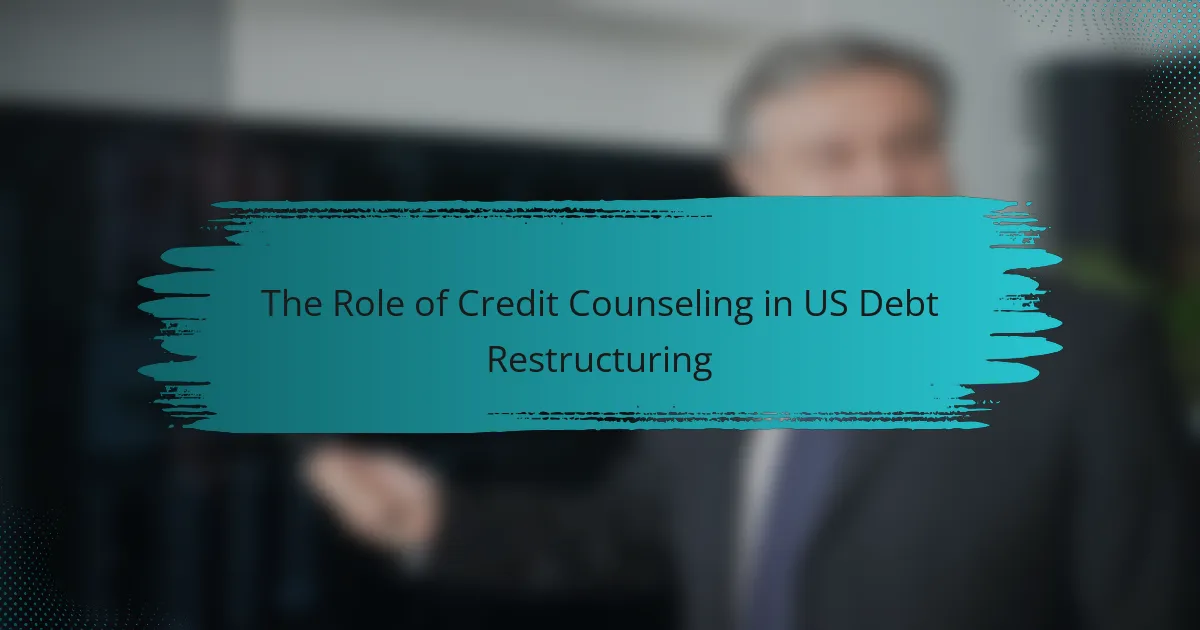Credit counseling is a vital service in the United States that assists individuals in managing and restructuring their debts. It involves a thorough assessment of a person’s financial situation, leading to the creation of personalized repayment plans and negotiations with creditors to achieve lower interest rates and monthly payments. Various types of credit counseling services, such as budget counseling, debt management plans, housing counseling, and credit report reviews, address specific financial challenges. The process typically includes an initial consultation, tailored advice, and ongoing support to ensure effective debt management. Credit counseling services are often accessible at little or no cost, making them a valuable resource for consumers seeking to improve their financial health.

What is the role of credit counseling in US debt restructuring?
Credit counseling plays a crucial role in US debt restructuring. It provides individuals with guidance on managing their debts effectively. Credit counselors assess a person’s financial situation and create tailored repayment plans. They help negotiate with creditors to lower interest rates and monthly payments. This process can lead to debt management plans that consolidate multiple debts into one payment. Additionally, credit counseling offers financial education to prevent future debt issues. According to the National Foundation for Credit Counseling, effective credit counseling can significantly improve a consumer’s financial health.
How does credit counseling assist individuals in managing debt?
Credit counseling assists individuals in managing debt by providing financial education and personalized debt management plans. It helps clients understand their financial situation and develop strategies to reduce debt. Counselors assess income, expenses, and debts to create a tailored budget. They negotiate with creditors for lower interest rates or payment plans. This can lead to more manageable monthly payments. Additionally, credit counseling provides resources for improving credit scores. Studies show that individuals who engage in credit counseling often see a reduction in debt levels over time.
What services do credit counseling agencies provide?
Credit counseling agencies provide services such as budgeting assistance, debt management plans, and financial education. They help clients create a personalized budget to manage expenses effectively. Debt management plans allow clients to consolidate payments and negotiate lower interest rates with creditors. Financial education workshops teach clients about credit scores and responsible borrowing. Many agencies also offer one-on-one counseling sessions to address individual financial concerns. These services aim to improve financial literacy and reduce debt-related stress. According to the National Foundation for Credit Counseling, these agencies assist millions of consumers annually.
How do these services impact a debtor’s financial situation?
Credit counseling services can significantly improve a debtor’s financial situation. They provide guidance on budgeting and managing debt. This helps debtors create a realistic repayment plan. Credit counselors negotiate with creditors to reduce interest rates and fees. Lowering these costs can make monthly payments more manageable. Additionally, credit counseling can enhance a debtor’s credit score over time. According to the National Foundation for Credit Counseling, clients often see improved financial stability after using these services. Thus, credit counseling plays a crucial role in helping debtors regain control over their finances.
Why is credit counseling important in the context of debt restructuring?
Credit counseling is important in the context of debt restructuring because it provides individuals with the knowledge and tools to manage their finances effectively. It helps clients understand their financial situation and develop a personalized plan to address their debts. Credit counselors assess clients’ income, expenses, and debts to create a realistic budget. They also negotiate with creditors on behalf of clients, potentially reducing interest rates or monthly payments. According to the National Foundation for Credit Counseling, 60% of clients who engage in credit counseling improve their financial situation within six months. This demonstrates the effectiveness of credit counseling in facilitating successful debt restructuring.
What are the potential consequences of not seeking credit counseling?
Not seeking credit counseling can lead to severe financial consequences. Individuals may struggle to manage their debts effectively. This can result in missed payments and increased interest rates. Over time, unpaid debts can accumulate, leading to bankruptcy. A lack of professional guidance may prevent individuals from exploring viable repayment options. Additionally, not seeking help can damage credit scores significantly. Poor credit can limit future borrowing opportunities. Ultimately, the absence of credit counseling can exacerbate financial distress and hinder recovery.
How can credit counseling prevent bankruptcy?
Credit counseling can prevent bankruptcy by providing individuals with financial education and personalized debt management plans. These services help clients understand their financial situation. Counselors assess income, expenses, and debts to create a budget. They also negotiate with creditors to lower interest rates or monthly payments. This reduces the overall financial burden on the individual. Research indicates that individuals who engage in credit counseling are less likely to file for bankruptcy. A study by the U.S. Department of Justice found that only 11% of those who completed credit counseling filed for bankruptcy, compared to 20% of those who did not seek help.

What types of credit counseling services are available?
There are several types of credit counseling services available. These include budget counseling, debt management plans, housing counseling, and credit report reviews. Budget counseling helps individuals create a plan for their finances. Debt management plans allow clients to consolidate debts and make manageable monthly payments. Housing counseling focuses on issues like foreclosure prevention and homebuyer education. Credit report reviews assist clients in understanding their credit scores and improving them. Each service targets specific financial challenges faced by consumers.
How do nonprofit credit counseling agencies differ from for-profit ones?
Nonprofit credit counseling agencies primarily focus on providing education and assistance to consumers without profit motives. They often offer services at little to no cost, funded by grants or donations. In contrast, for-profit credit counseling agencies aim to generate revenue and may charge higher fees for their services. Nonprofits typically adhere to strict ethical guidelines and regulations, promoting consumer welfare. For-profit agencies may prioritize financial gain, which can lead to conflicts of interest. Research indicates that nonprofit agencies often have better outcomes for clients, as their goal is to help rather than profit.
What are the benefits of choosing a nonprofit credit counseling service?
Choosing a nonprofit credit counseling service offers several benefits. These services provide personalized financial education and budgeting assistance. Clients receive tailored advice based on their unique financial situations. Nonprofit credit counselors often negotiate with creditors on behalf of clients. This can lead to lower interest rates and reduced monthly payments. Additionally, nonprofit services typically charge lower fees compared to for-profit agencies. Many nonprofit agencies are accredited and adhere to ethical standards. According to the National Foundation for Credit Counseling, clients who engage with nonprofit credit counseling report improved financial management skills. This can lead to a more sustainable financial future.
What should consumers be aware of when selecting a credit counseling agency?
Consumers should be aware of several key factors when selecting a credit counseling agency. First, ensure the agency is accredited by a recognized organization, such as the National Foundation for Credit Counseling (NFCC). Accreditation guarantees that the agency meets specific standards of quality and ethics.
Next, investigate the agency’s fees. Reputable agencies typically offer free consultations and charge reasonable fees for services. Avoid agencies with high upfront fees or those that pressure clients into costly services.
Additionally, check the agency’s reputation through online reviews and testimonials. A solid track record of helping clients successfully manage debt is essential.
Finally, confirm that the agency provides personalized service and a range of options tailored to individual financial situations. This flexibility is crucial for effective debt management.
What are the different methods of debt management offered by credit counselors?
Credit counselors offer several methods of debt management. These include debt management plans (DMPs), which consolidate payments into a single monthly payment to creditors. Credit counseling services also provide budgeting assistance to help clients manage their finances. Additionally, counselors may negotiate with creditors for lower interest rates or waived fees. They also offer financial education to empower clients in making informed decisions. Some counselors provide debt settlement services, negotiating to reduce the total amount owed. Each method aims to help individuals regain control over their financial situation.
How does a debt management plan (DMP) work?
A debt management plan (DMP) helps individuals manage their debt more effectively. It involves working with a credit counseling agency to create a structured repayment plan. The agency negotiates with creditors to reduce interest rates and monthly payments. Participants make a single monthly payment to the agency. The agency then distributes funds to creditors on behalf of the participant. DMPs typically last three to five years. During this time, participants may receive education on budgeting and financial management. Research indicates that DMPs can lead to significant debt reduction and financial stability for participants.
What are the advantages and disadvantages of enrolling in a DMP?
Enrolling in a Debt Management Plan (DMP) has several advantages and disadvantages.
Advantages include simplified payments. A DMP consolidates multiple debts into a single monthly payment. This can make budgeting easier for individuals. Many DMPs also negotiate lower interest rates with creditors. This can reduce the total amount paid over time.
Another advantage is the potential for improved credit scores. Successfully completing a DMP can demonstrate responsible financial behavior. This may lead to better credit opportunities in the future.
Disadvantages include potential fees. Some credit counseling agencies charge setup or monthly fees for managing a DMP. This can add to the overall cost of debt repayment.
Additionally, enrolling in a DMP may impact credit scores initially. Creditors may report the DMP status, which can lower scores temporarily.
Finally, individuals may face restrictions on new credit. Most DMPs require participants to refrain from taking on new debt during the plan. This can limit financial flexibility.

What is the process of working with a credit counselor?
The process of working with a credit counselor involves several key steps. First, individuals contact a credit counseling agency to schedule an appointment. During the initial consultation, the counselor reviews the individual’s financial situation. This includes income, expenses, debts, and credit history. Next, the counselor provides personalized advice and creates a tailored debt management plan. The plan outlines steps for budgeting and debt repayment. The counselor may also negotiate with creditors on behalf of the individual. Throughout the process, regular follow-ups ensure progress and adjustments to the plan if necessary. Credit counseling services are often free or low-cost, making them accessible for those in need.
What steps should individuals take to prepare for their first credit counseling session?
Individuals should gather all relevant financial documents before their first credit counseling session. This includes recent pay stubs, bank statements, and tax returns. They should also compile a list of monthly expenses and debts. It is important to have information on creditors and account balances. Individuals should prepare questions about the counseling process and options available. Setting financial goals for the session can provide direction. Finally, being open and honest about financial situations is crucial for effective counseling. These steps ensure a productive session and help counselors provide tailored advice.
What financial information is typically required during the initial consultation?
During the initial consultation, clients are typically required to provide a detailed overview of their financial situation. This includes income information, such as salary and any additional earnings. Clients must also disclose their monthly expenses, including housing, utilities, and food costs. Additionally, a list of all debts, including credit cards, loans, and any outstanding bills, is necessary. Clients should provide information on assets, such as bank accounts and property. Documentation, like pay stubs and tax returns, may also be requested to verify financial details. This comprehensive financial overview helps counselors devise appropriate debt restructuring strategies.
How can individuals maximize the benefits of their credit counseling sessions?
Individuals can maximize the benefits of their credit counseling sessions by being prepared and actively participating. Preparation involves gathering financial documents like income statements and bills. This information helps counselors provide tailored advice. Participants should set clear goals for their sessions. Defining objectives allows for focused discussions. Active engagement during sessions is crucial. Asking questions clarifies understanding and ensures all concerns are addressed. Following through on recommendations is essential for progress. Implementing strategies discussed in sessions leads to tangible results. Regularly reviewing progress with the counselor can enhance accountability. Studies show that clients who engage fully in counseling see better outcomes.
What role does education play in credit counseling?
Education plays a crucial role in credit counseling. It empowers clients with knowledge about financial management. Clients learn about budgeting, debt management, and credit scores. This education helps them make informed decisions. Studies show that educated clients are more likely to successfully manage their debts. For example, the National Foundation for Credit Counseling reports that clients who complete education programs show improved financial behaviors. Additionally, education fosters long-term financial stability. It equips individuals to avoid future financial pitfalls. Overall, education is fundamental to effective credit counseling and debt restructuring.
How do credit counselors educate clients on financial literacy?
Credit counselors educate clients on financial literacy through personalized guidance and structured programs. They assess clients’ financial situations to tailor advice. Counselors provide information on budgeting, saving, and managing debt. They often conduct workshops to cover essential financial topics. Educational materials are also provided for self-study. Many counselors use online resources for broader reach. Interactive tools help clients track their progress. Research shows that clients who engage with counselors improve their financial knowledge significantly.
What resources are available for ongoing financial education after counseling?
Various resources are available for ongoing financial education after counseling. These include online courses, financial literacy workshops, and budgeting tools. Websites like National Endowment for Financial Education (NEFE) offer free educational materials. Local community colleges often provide classes on personal finance. Nonprofit organizations may host seminars on money management. Additionally, mobile apps can assist with tracking expenses and setting financial goals. These resources support continued learning and help individuals maintain financial stability.
What are some tips for effectively utilizing credit counseling services?
To effectively utilize credit counseling services, begin by researching accredited agencies. Look for organizations that are certified by the National Foundation for Credit Counseling (NFCC) or the Financial Counseling Association of America (FCAA). Schedule an initial appointment to discuss your financial situation. Be prepared to provide detailed information about your income, expenses, and debts. This transparency allows counselors to offer tailored advice.
Participate actively during counseling sessions. Ask questions to clarify any uncertainties about the advice given. Take notes to help you remember important points. Follow the action plan suggested by the counselor diligently. This often includes budgeting and debt repayment strategies.
Regularly review your progress with the counselor. This helps to adjust the plan as necessary and keeps you accountable. Utilize any additional resources offered by the agency, such as workshops or financial education materials. These can enhance your understanding of managing finances effectively.
The main entity of the article is credit counseling, which plays a vital role in US debt restructuring by providing individuals with guidance on managing debts and creating tailored repayment plans. The article outlines how credit counseling assists individuals through financial education, budgeting assistance, and negotiation with creditors to lower interest rates and monthly payments. It discusses the various services offered by credit counseling agencies, the impact of these services on financial situations, and the importance of seeking credit counseling to prevent severe financial consequences, including bankruptcy. Additionally, it highlights the differences between nonprofit and for-profit agencies, the methods of debt management available, and the role of education in enhancing financial literacy for sustainable financial management.




